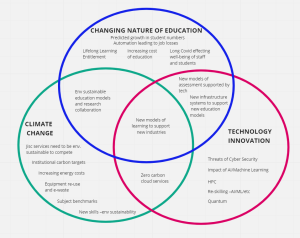The last few years have seen more drivers for change in education than normal. This has made our work to identify challenges and ideas around technology that will transform education in the future quite a challenge. What we need are some stable trends to help us to focus the direction of our activities. To be able to to say “we are looking at this challenge because it will help us to address this bigger challenge in the future”.
Based on previous analysis and retrospectives shifts, we believe that significant and accelerated change can be expected over the next 10 – 15 years, in both technology and socio-cultural responses to technology. We have identified the following three macro trends as being the most likely to impact education and drive change, but at this stage the full scale of that change is unknown:
- Changing nature of education
- Climate change
- Technology innovation
In the diagram below we have identified some of the implications of these macro trends.

We plan to monitor and explore the impact of these trends across tertiary education and research and use this to focus our codesign activity around the most interesting areas.
Changing nature of education
According to HolonIQ globally there will be 2 billion more people in education [school, college, university and alternative post-secondary graduates] by 2050. Driven primarily by greater participation and population growth. PWC forecasts that an increase in AI and automation will lead to around 30% job losses by 2030, which will increase demand, primarily in STEM subjects. Combine these trends with the rising costs of education and the lifelong learning entitlement from 2025 and we could see increased demand for a more inclusive flexible learning model that fits around existing commitments.
Climate change
The UK government has committed to reducing carbon emissions by 78% by 2035 and reaching net zero by 2050. UK universities are signed up to be net zero by 2050 with many aiming for earlier. Welsh colleges are committed to net zero by 2050.
Sustainability is becoming a prime consideration when applying for research funding and when procuring goods and services. Energy costs are rising fast and are impacting on institutions and students. Environmental knowledge is now embedded in subject benchmarks and demand for environmental sustainability skills is increasing across the board. Climate change is creating cultural shifts such as increased migration, increased poverty, changing demographics.
Advances in technology innovation
Emerging technology innovations will impact education. However, the sector often lags in adoption of technologies compared to the business sector. We now have an English AI national strategy and a Scottish AI national strategy. UKRI (UK Research and Innovation) have funded a UK national quantum computing centre due for completion 2023. We are already seeing emerging AI generated essays which will impact on assessment. Cyber security threats are on the increase. Meta-universities are being piloted in US (United States). The demand and costs of data storage and HPC (High Performance Computing) are increasing.
Intersections:
The intersections of these macro trends create some more complex challenges. Emerging new jobs and industries and technologies combined with climate change is likely to change the way education is delivered in the future and accelerate new models of education.
We plan to explore this and other challenging areas such as:
- How do we scale high quality learning and assessment in an environmentally sustainable way?
- How can we support effective environmentally sustainable research collaboration?
- Can we move existing services to a zero carbon cloud?
- Can we partner to develop new technically advanced infrastructure systems that support delivery of new education models?
For further information please contact innovation@jisc.ac.uk
